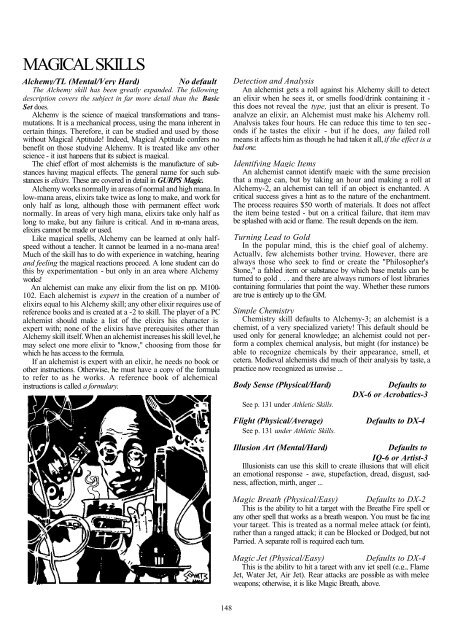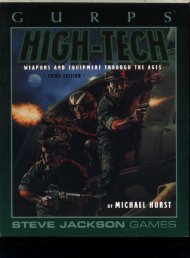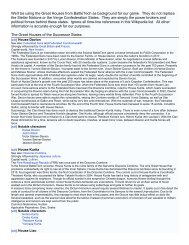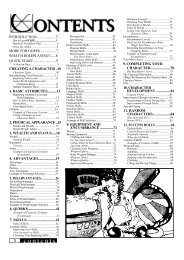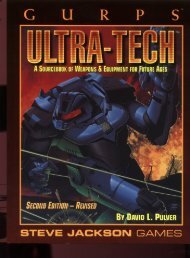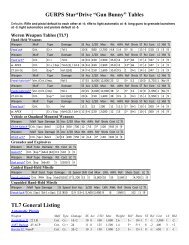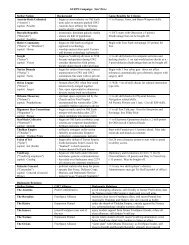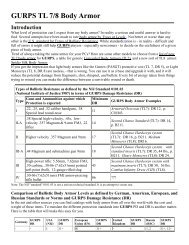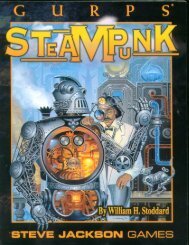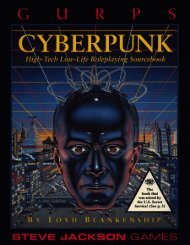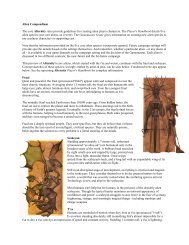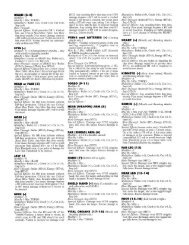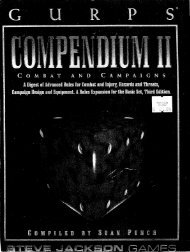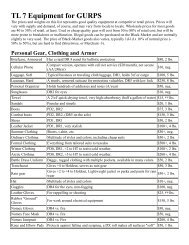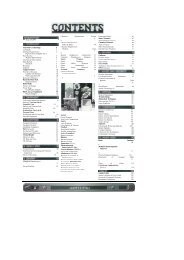GURPS - Compendium 1..
GURPS - Compendium 1..
GURPS - Compendium 1..
You also want an ePaper? Increase the reach of your titles
YUMPU automatically turns print PDFs into web optimized ePapers that Google loves.
MAGICAL SKILLS<br />
Alchemy/TL (Mental/Very Hard) No default<br />
The Alchemy skill has been greatly expanded. The following<br />
description covers the subject in far more detail than the Basic<br />
Set does.<br />
Alchemy is the science of magical transformations and transmutations.<br />
It is a mechanical process, using the mana inherent in<br />
certain things. Therefore, it can be studied and used by those<br />
without Magical Aptitude! Indeed, Magical Aptitude confers no<br />
benefit on those studying Alchemy. It is treated like any other<br />
science - it just happens that its subject is magical.<br />
The chief effort of most alchemists is the manufacture of substances<br />
having magical effects. The general name for such substances<br />
is elixirs. These are covered in detail in <strong>GURPS</strong> Magic.<br />
Alchemy works normally in areas of normal and high mana. In<br />
low-mana areas, elixirs take twice as long to make, and work for<br />
only half as long, although those with permanent effect work<br />
normally. In areas of very high mana, elixirs take only half as<br />
long to make, but any failure is critical. And in no-mana areas,<br />
elixirs cannot be made or used.<br />
Like magical spells, Alchemy can be learned at only halfspeed<br />
without a teacher. It cannot be learned in a no-mana area!<br />
Much of the skill has to do with experience in watching, hearing<br />
and feeling the magical reactions proceed. A lone student can do<br />
this by experimentation - but only in an area where Alchemy<br />
works!<br />
An alchemist can make any elixir from the list on pp. M100-<br />
102. Each alchemist is expert in the creation of a number of<br />
elixirs equal to his Alchemy skill; any other elixir requires use of<br />
reference books and is created at a -2 to skill. The player of a PC<br />
alchemist should make a list of the elixirs his character is<br />
expert with; none of the elixirs have prerequisites other than<br />
Alchemy skill itself. When an alchemist increases his skill level, he<br />
may select one more elixir to "know," choosing from those for<br />
which he has access to the formula.<br />
If an alchemist is expert with an elixir, he needs no book or<br />
other instructions. Otherwise, he must have a copy of the formula<br />
to refer to as he works. A reference book of alchemical<br />
instructions is called a formulary.<br />
Detection and Analysis<br />
An alchemist gets a roll against his Alchemy skill to detect<br />
an elixir when he sees it, or smells food/drink containing it -<br />
this does not reveal the type, just that an elixir is present. To<br />
analyze an elixir, an Alchemist must make his Alchemy roll.<br />
Analysis takes four hours. He can reduce this time to ten sec -<br />
onds if he tastes the elixir - but if he does, any failed roll<br />
means it affects him as though he had taken it all, if the effect is a<br />
bad one.<br />
Identifying Magic Items<br />
An alchemist cannot identify magic with the same precision<br />
that a mage can, but by taking an hour and making a roll at<br />
Alchemy-2, an alchemist can tell if an object is enchanted. A<br />
critical success gives a hint as to the nature of the enchantment.<br />
The process requires $50 worth of materials. It does not affect<br />
the item being tested - but on a critical failure, that item may<br />
be splashed with acid or flame. The result depends on the item.<br />
Turning Lead to Gold<br />
In the popular mind, this is the chief goal of alchemy.<br />
Actually, few alchemists bother trying. However, there are<br />
always those who seek to find or create the "Philosopher's<br />
Stone," a fabled item or substance by which base metals can be<br />
turned to gold . . . and there are always rumors of lost libraries<br />
containing formularies that point the way. Whether these rumors<br />
are true is entirely up to the GM.<br />
Simple Chemistry<br />
Chemistry skill defaults to Alchemy-3; an alchemist is a<br />
chemist, of a very specialized variety! This default should be<br />
used only for general knowledge; an alchemist could not perform<br />
a complex chemical analysis, but might (for instance) be<br />
able to recognize chemicals by their appearance, smell, et<br />
cetera. Medieval alchemists did much of their analysis by taste, a<br />
practice now recognized as unwise ...<br />
Body Sense (Physical/Hard)<br />
See p. 131 under Athletic Skills.<br />
Defaults to<br />
DX-6 or Acrobatics-3<br />
Flight (Physical/Average)<br />
See p. 131 under Athletic Skills.<br />
Defaults to DX-4<br />
Illusion Art (Mental/Hard)<br />
Defaults to<br />
IQ-6 or Artist-3<br />
Illusionists can use this skill to create illusions that will elicit<br />
an emotional response - awe, stupefaction, dread, disgust, sadness,<br />
affection, mirth, anger ...<br />
Magic Breath (Physical/Easy) Defaults to DX-2<br />
This is the ability to hit a target with the Breathe Fire spell or<br />
any other spell that works as a breath weapon. You must be facing<br />
your target. This is treated as a normal melee attack (or feint),<br />
rather than a ranged attack; it can be Blocked or Dodged, but not<br />
Parried. A separate roll is required each turn.<br />
Magic Jet (Physical/Easy) Defaults to DX-4<br />
This is the ability to hit a target with any jet spell (e.g., Flame<br />
Jet, Water Jet, Air Jet). Rear attacks are possible as with melee<br />
weapons; otherwise, it is like Magic Breath, above.<br />
148


